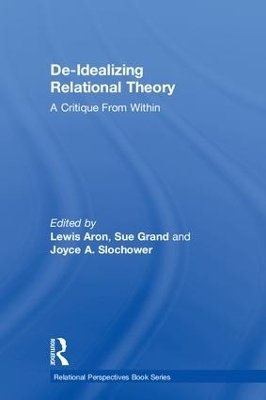
De-Idealizing Relational Theory
Routledge (Verlag)
978-1-138-08015-7 (ISBN)
De-Idealizing Relational Theory attempts to rectify this for the relational field. This book is a first in the history of psychoanalysis; it takes internal dissension and difference seriously rather than defensively. Rather than saying that the other’s reading of relational theory is wrong, distorted, or a misrepresentation, this book is interested in querying how theory lends itself to such characterizations. How have psychoanalysts participated in conveying this portrayal to their critics? Might this dissension illuminate blind-spot(s) and highlight new areas of growth?
It's a challenge to engage in psychoanalytic self-critique. To do so requires that we move beyond our own assumptions and deeply held beliefs about what moves the treatment process and how we can best function within it. To step aside from ourselves, to question the assumed, to take the critiques of others seriously, demands more than an absence of defensiveness. It requires that we step into the shoes of the psychoanalytic Other and suspend not only our theories, but our emotional investment in them. There are a range of ways in which our authors took up that challenge. Some revisted the assumptions that underlay early relational thinking and expanded their sources (Greenberg & Aron). Some took up specific aspects of relational technique and unpacked their roots and evolution (Mark, Cooper). Some offered an expanded view of what constitutes relational theory and technique (Seligman, Corbett, Grossmark). Some more directly critiqued aspects of relational theory and technique (Berman, Stern). And some took on a broader critique of relational theory or technique (Layton, Slochower).
Unsurprisingly, no single essay examined the totality of relational thinking, its theoretical and clinical implications. This task would be herculean both practically and psychologically. We're all invested in aspects of what we think and what we do; at best, we examine some, but never all of our assumptions and ideas. We recognize, retrospectively, how very challenging a task this was; it asked writers to engage in what we might think of as a self-analysis of the countertransference. Taken together these essays represent a significant effort at self-critique and we are enormously proud of it.
Each chapter critically assesses and examines aspects of relational theory and technique, considers its current state and its relations to other psychoanalytic approaches. De-Idealizing Relational Theory will appeal to all relational psychoanalysts and psychoanalytic psychotherapists.
Lewis Aron, Ph.D., ABPP is the director of the New York University Postdoctoral Program in Psychotherapy and Psychoanalysis. He is the author and editor of numerous articles and books on psychotherapy and psychoanalysis and well known for his study and reading groups around the world. His most recent book, co-authored with Galit Atlas, is the Routledge title Dramatic Dialogue: Contemporary Clinical Practice. Sue Grand, Ph.D., is faculty at the NYU Postdoctoral Program in Psychotherapy and Psychoanalysis. She is the author of The Reproduction of Evil: A Clinical and Cultural Perspective and The Hero in the Mirror, and co-edited two books on the trans-generational transmission of trauma. She practices in NYC and in Teaneck, NJ. Joyce Slochower, Ph.D., ABPP is Professor Emerita at Hunter College and Graduate Center, the City University of New York. She is on the faculty of the New York University Postdoctoral Program, the Steven Mitchell Center, the National Training Program of NIP, the Philadelphia Center for Relational Studies, and the Psychoanalytic Institute of Northern California in San Francisco. She is the author of Holding and Psychoanalysis and Psychoanalytic Collisions. Second editions of both books were released in 2014. She is in private practice in New York City, where she sees individuals and couples, and runs supervision and study groups.
Introduction Lewis Aron, Sue Grand, and Joyce Slochower 1. Going too far: Relational heroines and relational excess Joyce Slochower 2. The emergence of the relational tradition: Lewis Aron interviews Jay Greenberg Jay Greenberg & Lewis Aron 3. Relational psychoanalysis and its discontents Emanuel Berman 4. Forms of equality in relational psychoanalysis David Mark 5. Needed analytic relationships and the disproportionate relational focus on enactments Steve Stern 6. Inaction and Puzzlement as Interaction: Keeping Attention in Mind Stephen Seligman 7. The analyst’s private space: Spontaneity, ritual, psychotherapeutic action, and self-care Ken Corbett 8. The unobtrusive relational analyst and psychoanalytic companioning Robert Grossmark 9. The things we carry: Finding/creating the object and the analyst’s self-reflective participation Steven Cooper 10. Relational theory in socio-historical context: Implications for technique Lynne Layton
| Erscheinungsdatum | 18.08.2018 |
|---|---|
| Reihe/Serie | Relational Perspectives Book Series |
| Verlagsort | London |
| Sprache | englisch |
| Maße | 156 x 234 mm |
| Gewicht | 508 g |
| Themenwelt | Geisteswissenschaften ► Psychologie ► Klinische Psychologie |
| Geisteswissenschaften ► Psychologie ► Psychoanalyse / Tiefenpsychologie | |
| Medizin / Pharmazie ► Medizinische Fachgebiete ► Psychiatrie / Psychotherapie | |
| ISBN-10 | 1-138-08015-2 / 1138080152 |
| ISBN-13 | 978-1-138-08015-7 / 9781138080157 |
| Zustand | Neuware |
| Haben Sie eine Frage zum Produkt? |
aus dem Bereich


